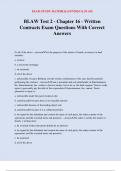EXAM STUDY MATERIALS 8/7/2024 11:29 AM
BLAW Test 2 - Chapter 16 - Written
Contracts Exam Questions With Correct
Answers
D. all of the above - answer✔✔For the purpose of the statute of frauds, an interest in land
includes:
a. a house.
b. a real estate mortgage
c. an easement
d. all of the above
c. enforceable, because Bellman sent the written confirmation of the sale, thereby partially
performing the contract. - answer✔✔Tuan is president and sole shareholder of Entertainment,
Inc. Entertainment, Inc. wishes to borrow money, but to do so, the bank requires Tuan to orally
agree to personally pay the debt of the corporation if Entertainment, Inc. cannot. Tuan's
guarantee to repay is:
a. enforceable under the parol evidence rule.
b. unenforceable because there is no insurable interest.
c. enforceable because of the leading object rule
d. unenforceable because it is a collateral promise
b. be signed by the defendant and contain the name of each party, the subject matter of the
agreement, and the essential terms and promises. - answer✔✔In order to satisfy the statute of
frauds, a writing must:
a. be a formal written document drafted by an attorney
b. be signed by the defendant and contain the name of each party, the subject matter of the
agreement, and the essential terms and promises.
c. be notarized
d. all of the above
, EXAM STUDY MATERIALS 8/7/2024 11:29 AM
c. enforceable, because Willis has partially performed the oral contract and made improvements
on the land. - answer✔✔Willis and Leslie orally agree to the sale of a parcel of land for $50,000:
one-half payable now as a down payment; one-half payable in 30 days at the time of closing
when the title will be transferred. The buyer, Willis, is to have possession immediately. Willis
pays Leslie $25,000, takes possession of the land, and starts building a house. At the time of
closing, Willis has made a substantial beginning on the house. However, Leslie refuses to
transfer the title, claiming the oral contract is not enforceable. This contract is:
a. enforceable, because the statute of frauds does not apply to this interest in land.
b. unenforceable, because there is no writing signed by Leslie.
c. enforceable, because Willis has partially performed the oral contract and made improvements
on the land.
d. unenforceable, because the parol evidence rule applies.
b. The contractor can collect from the estate only. - answer✔✔Abby dies, and her good friend,
Clay is appointed to administer Abby's estate. Abby's house was in poor condition, so Clay orally
hired a contractor to make repairs. Clay also orally promised that if the estate could not pay the
repair bill, he would pay it even though he does not live in the house and has no entitlement
under Abby's estate. The estate does not pay the repair bill. Who can the contractor collect from,
if anyone?
a. The contractor can collect from either the estate or Clay.
b. The contractor can collect from the estate only.
c. The contractor can collect from Clay only.
d. The contractor must collect from the estate first, and then collect any deficiency from Clay.
b. Derek will win because the writing is sufficient under the statute of frauds. - answer✔✔Derek
and Abyan were discussing business over lunch when they agreed on the sale of a five-acre
parcel of land. Since neither of them had any paper with them, Derek wrote the following on a
napkin: "Abyan agrees to purchase from Derek a 5-acre parcel located at the local address of 123
105th Street, St. Joseph, Minnesota, U.S.A. for the price of $4,500 per acre. Transfer of title,
payment, and possession to take place on May 1, 2011." Abyan signed the napkin. On May 1,
2011, Derek was ready to close the deal and transfer title but Abyan refused to pay the purchase
price. If Derek sues Abyan for the price of the land, the most likely result will be:
a. Abyan will win because the writing is not sufficient under the statute of frauds.
b. Derek will win because the writing is sufficient under the statute of frauds.
c. Abyan will win because Derek did not sign the writing.
d. Derek will win because the statute of frauds d




